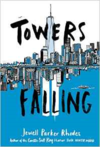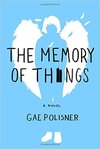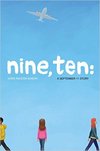The contribution of fiction writers is often underrated when it comes to dealing with tough subjects like 9/11. After all, people read books for entertainment, or to get away from the stresses of life. Difficult, grief-filled subjects like 9/11 are not the stuff your latest novel should be made of.
Wrong. Experts agree that fiction is a powerful way to understand complex ideas. For example, a recent article in Psychology Today shows that reading fiction "improves the reader's ability to put themselves in another person's shoes and flex the imagination in a way that is similar to the visualization of a muscle."
Further, a study published in the Scientific American shows that reading literary fiction prompts children to imagine the characters' introspective dialogues, offering a sort of psychological awareness that carries over into the real world. Characters disrupt reader expectations, undermining prejudices and stereotypes; they support and teach us values about social behavior, such as the importance of understanding those who are different from ourselves."
Why read about 9/11 at all? The worst terrorist attack in our nation's history may have happened fifteen years ago but the wounds have still not healed. For adults like myself who remember it like it was yesterday, for families like mine who suffer the ever-rising Islamophobia, and for children like my own who were not yet born when the towers fell, but understand the import of that single event in our beloved nation's history, fiction can help. Seriously.
Children in elementary and middle school have questions about 9/11 because it is a mysterious thing for them. They know how adults feel about it because they watch their parents' somber eyes and they hear the heated discussions on television. If they belong to a Middle Eastern or South Asian family they may even have felt the ugly repercussions. But they can only truly empathize when they read fiction around this tragedy. Here are four children's books about 9/11 that your child should read, pronto:
The Memory of Things by Gae Polisner, just released this week, is the newest of a list of children's novels about 9/11. On the morning of 9/11, 16-year-old Kyle Donohue watches the first twin tower come down from the window of his high school. Moments later, terrified and fleeing home to safety across the Brooklyn Bridge, he stumbles across a girl perched in the shadows, covered in ash, and wearing a pair of costume wings.
Nine, Ten: A September 11 Story by Nora Raleigh Baskin. Published in June 2016 this Middle Grade novel follows four children in the days before 9/11, including a Muslim girl. Through this book, young readers can share the emotions of those who witnessed the attack, including the backlash against the Muslim community. In an interview Baskin explains her motivation to writing such a difficult topic: "I wanted to write about the seismic shift in our country that occurred that day... about the changes, large and small, that children born after 2001 are unaware of."

Towers Falling by Jewell Parker Rhoads. When Deja, a fifth grader, begins at a new school, she makes friends with a Muslim girl and a boy whose father is an Iraq War veteran. When their teacher begins a lesson about September 11, the three friends learn how the day's events relate to them as individuals and as part of their wider community.
Just a Drop of Water by Kerry O'Malley Cerra. Jake Green's best friend and neighbor, Sam Medina, an Arab Muslim boy, is bullied in class after 9/11. Sam's father is taken into FBI custody after the discovery that he serviced one of the hijackers at the bank where he worked. Jake soon finds himself at odds with his immediate family as he defends his best friend's honor and tries to help bring Mr. Medina home.
One may ask, do our children really need to know about a horrific chapter in our history? While the topic can be stressful for children, the authors of 9/11 books feel strongly that learning leads to understanding and empathy. In an interview, Polisner explains why fiction around 9/11 is essential today: "I think kids have grown up with 9/11 being the ever-present backdrop of their parents' and teachers' lives, but it feels ancient to them and they don't feel connected. I think they're hungry to feel that connection and story/fiction is a safe and compelling way to bring them in and let them see both how we were torn apart and changed forever, but also how we were drawn together and gained a new understanding of how very small our world is. That we need to care about the rest of the world and not just ourselves."



